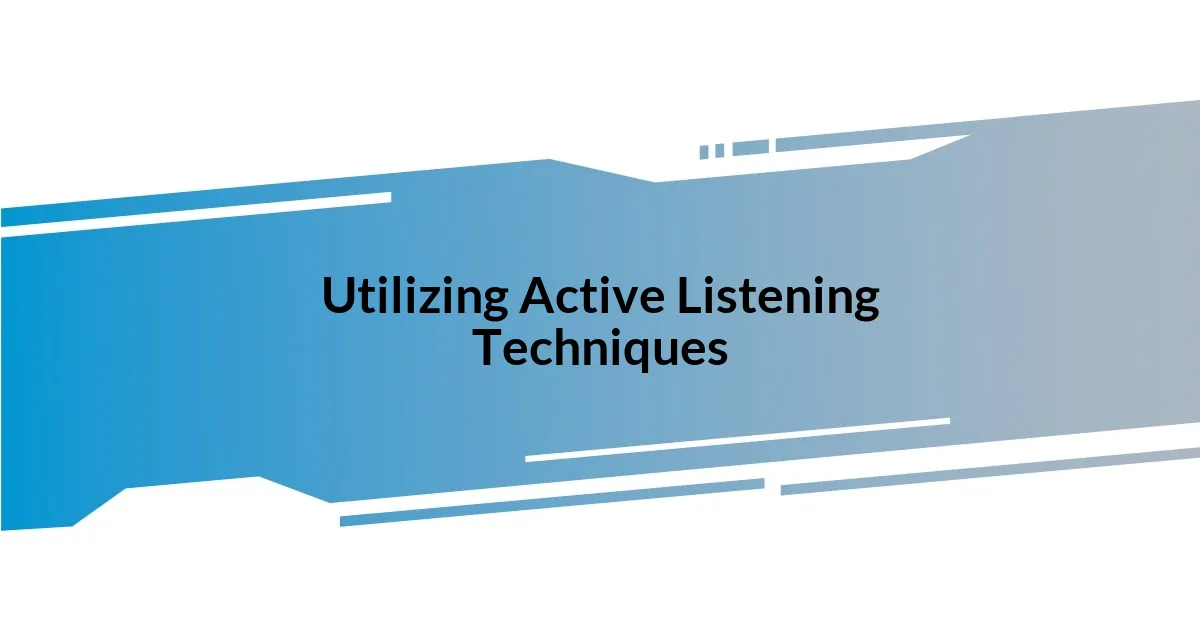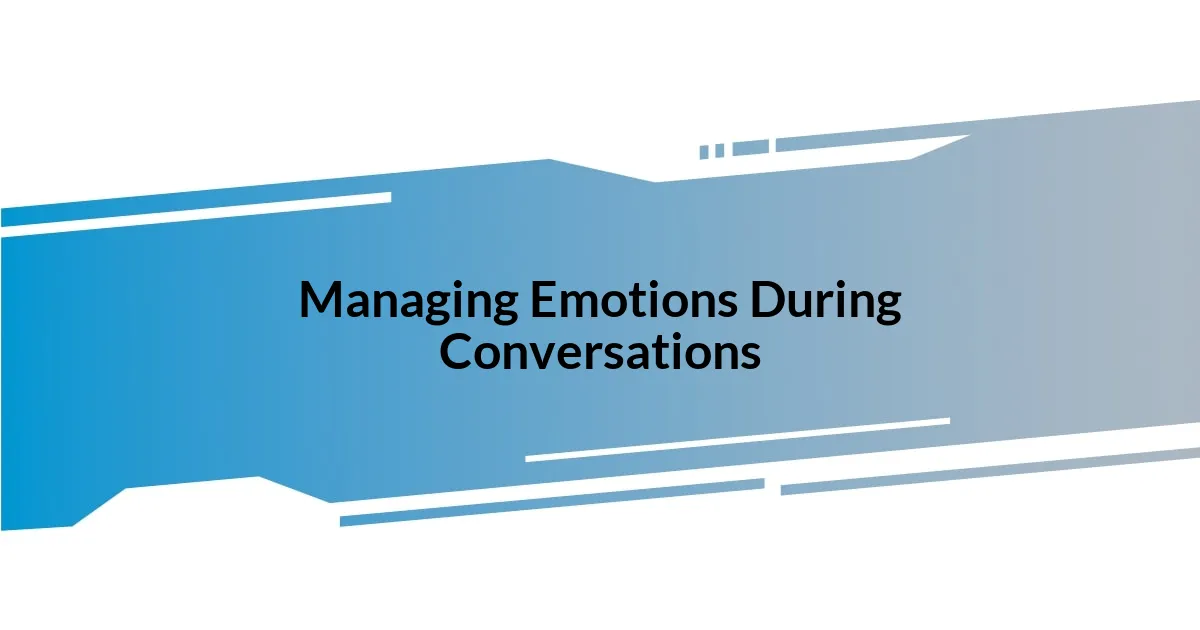Key takeaways:
- Identifying tough topics like mental health, relationships, and societal issues can facilitate deeper connections and understanding.
- Active listening techniques, such as maintaining eye contact and asking open-ended questions, contribute to more meaningful conversations.
- Managing emotions and practicing vulnerability during discussions can strengthen relationships and promote honesty.
- Following up after difficult conversations helps clarify misunderstandings and fosters ongoing communication and growth.

Identifying Specific Tough Topics
When I think about tough topics, a few significant areas come to mind, like mental health, bullying, or even financial struggles. It’s interesting how we often tiptoe around these subjects, isn’t it? Personally, I remember hesitating to discuss my experiences with anxiety because I feared judgment, yet it turned out to be a crucial conversation that lifted a weight off my shoulders.
Another challenging area could be relationships—whether it’s a breakup, a complicated family dynamic, or feeling disconnected with friends. I recall a time when I finally confronted a close friend about growing apart. That talk was nerve-wracking, but once we both opened up, it felt as though a fog had lifted, allowing us to either mend our friendship or amicably acknowledge the changes in our lives.
We should also consider societal issues, such as racism, sexism, and climate change, which often spark heated debates. Have you ever found yourself in a conversation that shifted the room’s energy? I’ve been there—discussing climate change at a dinner party was uncomfortable, but it ignited a passionate dialogue that made everyone reflect. Identifying these specific tough topics in our lives can lead to deeper connections and understanding.

Utilizing Active Listening Techniques
Active listening is not just a technique; it’s a vital skill that can transform tough conversations. I’ve experienced that when I genuinely listen—putting aside distractions and focusing on the speaker’s words—it fosters a safe space for them to express their feelings. For instance, during a discussion about a friend’s recent struggle with depression, I made a conscious effort to listen without interjecting my thoughts. The result was profound; she felt seen and heard, which opened doors to deeper insights about her feelings.
Here are some active listening techniques that can enhance your conversations:
- Maintain eye contact: It shows you’re engaged and interested.
- Use affirming nods and verbal cues: A simple “I see,” or a nod can encourage the speaker to continue.
- Reflect back what you hear: Phrases like, “What I hear you saying is…” help clarify and validate their feelings.
- Avoid interrupting: Wait for pauses before sharing your thoughts; this demonstrates respect for their perspective.
- Ask open-ended questions: Encourage elaboration with questions like, “How did that make you feel?” or “Can you tell me more about that?”
In my own experiences, these techniques not only helped my friends feel valued, but they also deepened my understanding of complex emotions involved in our discussions. I found these techniques invaluable during a recent conversation about a family conflict, where I had to put my own opinions aside to allow my sibling the space to share their side. It brought us closer and helped resolve lingering tensions.

Managing Emotions During Conversations
Managing emotions during tough conversations can be challenging, yet it’s so integral to achieving understanding. I remember a time when I discussed my feelings about a friend moving away. It was tough to voice my sadness without feeling like I was burdening her, but by acknowledging my emotions, I allowed for a more genuine exchange that ultimately strengthened our friendship rather than pushed it away. This vulnerability is often the key to deeper connections.
In heated moments, it’s easy to become overwhelmed. My personal strategy has always involved grounding techniques. For instance, during a recent conversation about political views, I felt my heart racing and my palms sweating. I took a moment to breathe deeply and focus on my surroundings. This simple act helped me regain composure, allowing me to engage thoughtfully rather than react impulsively. Trust me, it transformed the dialogue.
Emotions can swirl like a storm during tough discussions, requiring a balance between honesty and empathy. I’ve learned that using “I” statements—like “I feel anxious when we talk about this”—rather than accusatory language can diffuse tension. This way, I express my perspective without placing blame, creating a more open and inviting atmosphere for communication.
| Technique | Description |
|---|---|
| Grounding Techniques | Simple actions like deep breathing can help refocus and manage anxiety during conversations. |
| Using “I” Statements | Expressing feelings personally can promote understanding and reduce defensiveness in your conversation partner. |
| Validating Emotions | Acknowledging the emotions of others can create an environment where both parties feel safe. |
| Finding Common Ground | Identifying shared experiences can alleviate tension and foster connection. |

Encouraging Open and Honest Dialogue
When it comes to discussing tough topics, I believe creating an environment where open dialogue flourishes is essential. Once, I had a difficult conversation with a colleague about a project that didn’t go as planned. Instead of shying away from the subject, we carved out some time to sit down without distractions. By sharing our thoughts candidly, we not only addressed the issues but also built a stronger rapport based on trust. Have you ever noticed how open conversations can instantly ease tensions? It’s amazing how just being transparent makes both parties feel less alone.
Encouraging honesty isn’t just about creating a physical space; it’s also about fostering emotional comfort. I recall a time when a friend hesitated to share their struggles with mental health. By revealing my own vulnerability about my anxiety, I found that my transparency encouraged them to open up as well. It was a poignant moment, reminding me how vulnerability breeds vulnerability. Don’t you think that sharing our own experiences can prompt others to do the same? It’s the heart of meaningful dialogue.
Moreover, I find that setting ground rules before a difficult conversation can lead to more productive discussions. For example, during a family meeting about a sensitive issue, we established that everyone would get a chance to speak without interruption. This rule helped calm the energy in the room, allowing us to express ourselves openly. It’s fascinating how just a simple guideline can create a framework for respectful exchange, isn’t it? In my view, creating these boundaries helps everyone feel heard and valued, laying the groundwork for honest dialogue.

Following Up After the Discussion
After engaging in tough conversations, it’s essential to follow up thoughtfully. I recall a time when I had a difficult discussion with my sibling about our relationship. A few days later, I sent a simple text to check in, expressing my hope that they felt heard. This small gesture not only reassured them, but it also opened the door for further discussion and healing. Isn’t it remarkable how such a simple act can strengthen our bonds?
Checking in isn’t just about verifying that everything is okay; it’s also a chance to clarify points that may have been misunderstood. For instance, after discussing career goals with a close friend, I realized that some of my comments might have come across as critical. I followed up with a quick coffee meetup where we could revisit the conversation. That face-to-face time allowed us to address any lingering confusion and reinforced how much I value their aspirations. How often do we miss the opportunity to clarify and bond after a tough talk?
Moreover, I believe reflecting on the discussion can provide valuable insights for the future. After a challenging dialogue with my team about project setbacks, we took a moment to look back and identify our takeaways. Each person shared what went well and what could improve next time, fostering a sense of collaboration and growth. Have you considered how reflection can turn a tense moment into a learning experience? I find that these discussions help us evolve, both individually and collectively.